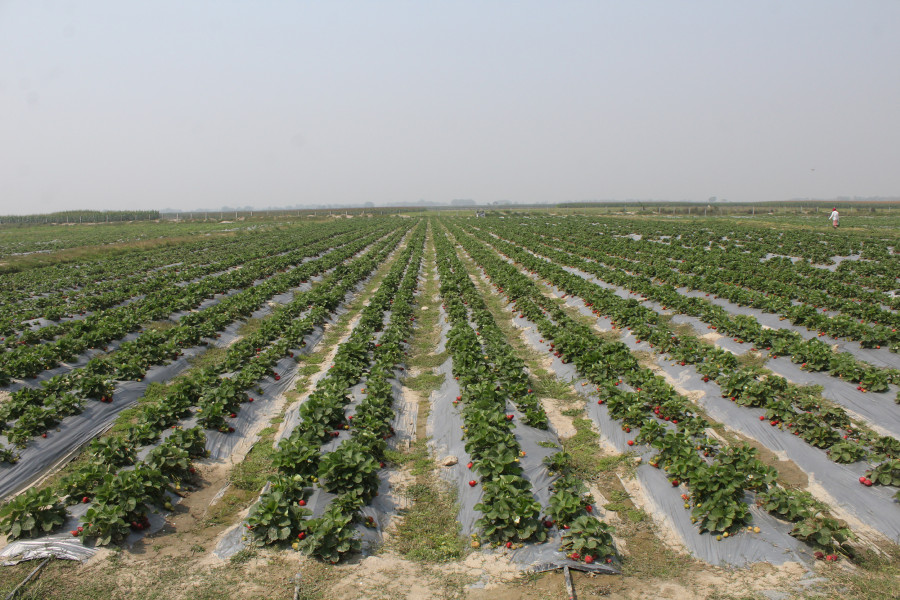Money
Strawberry fields in Tarai producing good harvests
The Golyan Group started commercial strawberry farming on 25 bighas in Bhagudubba.
Arjun Rajbanshi
Manjil Roman was working in Dubai when he heard that farmers were growing strawberries in Bhagudubba, Bahradashi rural municipality. He returned home last week, and one of the first things he did was to go to the farm to buy the fruit.
Another fan, Binod Rajbanshi, visits Bhagudubba twice a week to enjoy strawberries with his friends. Locals of Rajgadh, Chakchaki, Dangibari, Ghailadubba, Goldhap, Gherabari and Birtamod often go to the farm to taste strawberries.
The Golyan Group of Kathmandu bought 32 bighas of land in Bhagudubba and started commercial strawberry farming on 25 bighas.
The strawberry crop planted between mid-October and mid-January is starting to bear fruit, said Bibek Shukla, a technician at the Golyan Group. The plants started flowering in mid-December. Shukla said that the farm produced 9 tonnes of strawberries from December to mid-March.
Strawberry is generally grown in the cold and high Himalayan areas, but farmers have been successful in growing the fruit in the hot Tarai plains too, Shukla said.
“This year, the weather was favourable for strawberry farming,” he said. They started the strawberry farm amid doubts if the fruit would grow well in the Tarai, and the good harvest has been very encouraging, he said.
The group is planning to expand strawberry farming from next year. He said that the strawberry plants started producing fruit within two months of sowing.
Strawberry has got a good market and value. “Strawberry is being sold for Rs800 to Rs1,000 per kg,” he said. He has been selling 60-70 kg of strawberries directly from the farm daily.
The firm also sells the fruits from a store in Birtamod. According to him, daily strawberry sales at the Birtamod store amount to 100 kg.
Strawberries grown at the farm are shipped to Biratnagar, Dharan, Itahari, Kathmandu and India too, he said. They sent a shipment of 25 kg to Dubai last December as a sample. But their requirement amounts to 7 tonnes daily which far exceeds output, and so the firm could not secure an export order.
The group brought strawberry saplings from India. Shukla said that four types of strawberry plants have been planted—Kamaroja, Winterdown, Nevila and Sweet Sensation.
Rajendra Bhatta, a staffer at the farm, said that they brought strawberry plants worth Rs600,000. Strawberry saplings are planted 30 centimetres apart on ridges, and each ridge is watered with drip irrigation.
The farm uses only organic fertiliser. “We are doing organic fruit farming,” he said. As strawberry farming is being done on such a large area, the domestic market alone cannot consume the entire harvest, and it has to be exported.
Organic cultivation is the first requirement for the export of fruits, and that is why the farm does not use even a little bit of chemical fertiliser. The farm employs 50 local women daily, Bhatta said.
More than 100 people come to visit the farm daily, Bhatta said, adding that the number increases on public holidays. Agriculture students, farmer groups and cooperative groups also come to tour the farm daily.
Shambhu Singh Rajbanshi, ward chairperson, said that the government should prioritise such farming as it provides good income in a short time.




 9.7°C Kathmandu
9.7°C Kathmandu















